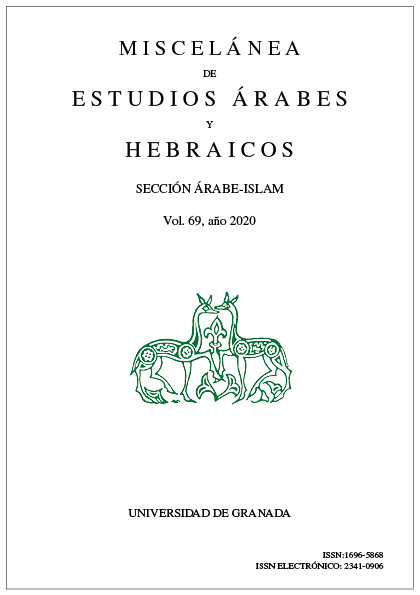Al-Andalus: from regained paradise to essential experience
DOI:
https://doi.org/10.30827/meaharabe.v69i0.1026Keywords:
Al-Andalus, Modern Arabic literatureAbstract
This article analyzes the perception of al-Andalus and its characteristics in the eyes of six Arab authors writing between 1964 and 2010. It looks first at Hussain Monés (1911-1996), who in his Journey through Spain shows it as a kind of paradise regained. The study then turns to the Egyptians Salah Abdel Sabour (1931-1981), who wrote about Federico García Lorca, and Radwa Ashour (1946-2010), who wrote about the Moriscos and al-Andalus. To conclude, the paper analyses some authors who have a vision that shows signs of incipient engagement, albeit incipient, be it social, political or historical engagement. These authors include the Syrian poet Nizar Qabbani (1923-1998), the Syrian-Lebanese Adonis (b. 1930), as an essayist, and the Algerian novelist Waciny Laredj (b. 1954). The study has used the original works of the authors themselves and also theoretical frameworks developed by the main scholars in this area. Regarding the results and conclusions, in addition to showing that the theme of al-Andalus remains valid in modern Arabic literature, the study reveals what could be called the essentialization of al-Andalus and also the greater relevance of this theme in prose writing.
Downloads
Downloads
Published
How to Cite
Issue
Section
License
The authors publishing their work in this journal agree to the following terms and conditions:
1. The authors retain the copyright and give the journal the right to be the first publication of the work and also to be licensee under a Creative Commons Attribution License which allows others to share the work, provided the author of the work and the initial publication in this journal are acknowledged.
2. Authors may make additional agreements separately for the non-exclusive distribution of the version of the work published in the journal (for example, putting it in an institutional repository or publishing it in a book), with acknowledgement of its initial publication in this journal.
3. Authors are allowed and encouraged to electronically disseminate (for example, in institutional repositories or on their own web page) the published version of their works (publisher's post-print version) or, if not possible, the author's reviewed and accepted post-print version. This is to facilitate productive exchanges, and allow for earlier and greater citation by third parties of the published works (See The Effect of Open Access).
4. The journal accepts no responsibility for the opinions expressed by the authors.



















